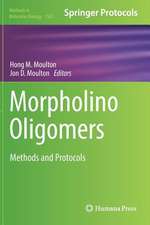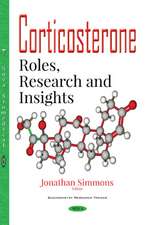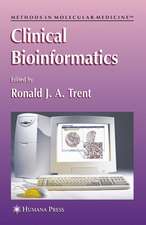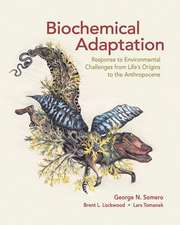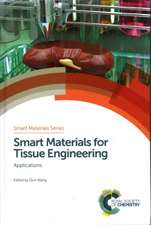Molecular Embryology: Methods and Protocols: Methods in Molecular Biology, cartea 461
Editat de Paul Sharpe, Ivor Masonen Limba Engleză Paperback – 19 noi 2010
| Toate formatele și edițiile | Preț | Express |
|---|---|---|
| Paperback (1) | 1236.50 lei 6-8 săpt. | |
| Humana Press Inc. – 19 noi 2010 | 1236.50 lei 6-8 săpt. | |
| Hardback (1) | 1246.47 lei 6-8 săpt. | |
| Humana Press Inc. – 20 oct 2008 | 1246.47 lei 6-8 săpt. |
Din seria Methods in Molecular Biology
- 9%
 Preț: 791.63 lei
Preț: 791.63 lei - 23%
 Preț: 598.58 lei
Preț: 598.58 lei - 20%
 Preț: 882.98 lei
Preț: 882.98 lei -
 Preț: 252.05 lei
Preț: 252.05 lei - 5%
 Preț: 802.70 lei
Preț: 802.70 lei - 5%
 Preț: 729.61 lei
Preț: 729.61 lei - 5%
 Preț: 731.43 lei
Preț: 731.43 lei - 5%
 Preț: 741.30 lei
Preț: 741.30 lei - 5%
 Preț: 747.16 lei
Preț: 747.16 lei - 15%
 Preț: 663.45 lei
Preț: 663.45 lei - 18%
 Preț: 1025.34 lei
Preț: 1025.34 lei - 5%
 Preț: 734.57 lei
Preț: 734.57 lei - 18%
 Preț: 914.20 lei
Preț: 914.20 lei - 15%
 Preț: 664.61 lei
Preț: 664.61 lei - 15%
 Preț: 654.12 lei
Preț: 654.12 lei - 18%
 Preț: 1414.74 lei
Preț: 1414.74 lei - 5%
 Preț: 742.60 lei
Preț: 742.60 lei - 20%
 Preț: 821.65 lei
Preț: 821.65 lei - 18%
 Preț: 972.30 lei
Preț: 972.30 lei - 15%
 Preț: 660.49 lei
Preț: 660.49 lei - 5%
 Preț: 738.41 lei
Preț: 738.41 lei - 18%
 Preț: 984.92 lei
Preț: 984.92 lei - 5%
 Preț: 733.29 lei
Preț: 733.29 lei -
 Preț: 392.60 lei
Preț: 392.60 lei - 5%
 Preț: 746.26 lei
Preț: 746.26 lei - 18%
 Preț: 962.66 lei
Preț: 962.66 lei - 23%
 Preț: 860.22 lei
Preț: 860.22 lei - 15%
 Preț: 652.64 lei
Preț: 652.64 lei - 5%
 Preț: 1055.50 lei
Preț: 1055.50 lei - 23%
 Preț: 883.87 lei
Preț: 883.87 lei - 5%
 Preț: 1141.13 lei
Preț: 1141.13 lei - 19%
 Preț: 491.89 lei
Preț: 491.89 lei - 5%
 Preț: 1038.86 lei
Preț: 1038.86 lei - 5%
 Preț: 524.16 lei
Preț: 524.16 lei - 18%
 Preț: 2122.34 lei
Preț: 2122.34 lei - 5%
 Preț: 1299.23 lei
Preț: 1299.23 lei - 5%
 Preț: 1339.12 lei
Preț: 1339.12 lei - 18%
 Preț: 1390.26 lei
Preț: 1390.26 lei - 18%
 Preț: 1395.63 lei
Preț: 1395.63 lei - 18%
 Preț: 1129.65 lei
Preț: 1129.65 lei - 18%
 Preț: 1408.26 lei
Preț: 1408.26 lei - 18%
 Preț: 1124.92 lei
Preț: 1124.92 lei - 18%
 Preț: 966.27 lei
Preț: 966.27 lei - 5%
 Preț: 1299.99 lei
Preț: 1299.99 lei - 5%
 Preț: 1108.51 lei
Preț: 1108.51 lei - 5%
 Preț: 983.76 lei
Preț: 983.76 lei - 5%
 Preț: 728.16 lei
Preț: 728.16 lei - 18%
 Preț: 1118.62 lei
Preț: 1118.62 lei - 18%
 Preț: 955.25 lei
Preț: 955.25 lei - 5%
 Preț: 1035.62 lei
Preț: 1035.62 lei
Preț: 1236.50 lei
Preț vechi: 1507.93 lei
-18% Nou
Puncte Express: 1855
Preț estimativ în valută:
236.63€ • 256.95$ • 198.77£
236.63€ • 256.95$ • 198.77£
Carte tipărită la comandă
Livrare economică 22 aprilie-06 mai
Preluare comenzi: 021 569.72.76
Specificații
ISBN-13: 9781617375651
ISBN-10: 1617375659
Pagini: 798
Ilustrații: XVII, 798 p.
Dimensiuni: 155 x 235 x 42 mm
Greutate: 1.14 kg
Ediția:Softcover reprint of hardcover 2nd ed. 2009
Editura: Humana Press Inc.
Colecția Humana
Seria Methods in Molecular Biology
Locul publicării:Totowa, NJ, United States
ISBN-10: 1617375659
Pagini: 798
Ilustrații: XVII, 798 p.
Dimensiuni: 155 x 235 x 42 mm
Greutate: 1.14 kg
Ediția:Softcover reprint of hardcover 2nd ed. 2009
Editura: Humana Press Inc.
Colecția Humana
Seria Methods in Molecular Biology
Locul publicării:Totowa, NJ, United States
Public țintă
ResearchCuprins
The Mouse Embryo.- The Mouse as a Developmental Model.- Culture of Postimplantation Mouse Embryos.- Organ Culture in the Analysis of Tissue Interactions.- Treatment of Mice with Retinoids In Vivo and In Vitro.- Analysis of Skeletal Ontogenesis through Differential Staining of Bone and Cartilage.- Cell Grafting and Labeling in Postimplantation Mouse Embryos.- Production of Transgenic Rodents by the Microinjection of Cloned DNA into Fertilized One-Celled Eggs.- Cre Recombinase Mediated Alterations of the Mouse Genome Using Embryonic Stem Cells.- Gene Trapping in Mouse Embryonic Stem Cells.- Application of lacZ Transgenic Mice to Cell Lineage Studies.- Transgenic RNA Interference to Investigate Gene Function in the Mouse.- Mouse Primordial Germ Cells.- Gene Transfer to the Rodent Embryo by Retroviral Vectors.- The Chicken Embryo.- The Avian Embryo.- Chick Embryos.- New Culture.- EC Culture.- Grafting Hensen's Node.- Grafting of Somites.- Microsurgical Manipulation of the Notochord.- Transplantation of Avian Neural Tissue.- Grafting of Apical Ridge and Polarizing Region.- Tissue Recombinations in Collagen Gels.- Quail—Chick Chimeras.- Using Fluorescent Dyes for Fate Mapping, Lineage Analysis, and Axon Tracing in the Chick Embryo.- Gene Transfer in Avian Embryos Using Replication-Competent Retroviruses.- Electroporation in Avian Embryos.- Amphibian Embryos.- An Overview of Xenopus Development.- Mesoderm Induction Assays.- Experimental Embryological Methods for Analysis of Neural Induction in the Amphibian.- A Method for Generating Transgenic Frog Embryos.- Axolotl/Newt.- Zebrafish And Medaka.- The Zebrafish.- Small-Scale Marker-Based Screening for Mutations in Zebrafish Development.- Microinjection and Cell Transplantation in Zebrafish Embryos.- Recent Advances inMeganuclease-and Transposon-Mediated Transgenesis of Medaka and Zebrafish.- Retinoids in Nonmammalian Embryos.- Nonvertebrate Chordates.- Protochordates.- Molecular Techniques.- Subtractive Hybridization and Construction of cDNA Libraries.- Differential Display of Eukaryotic mRNA.- Using DNA Microarrays.- Profiling Gene Transcription in the Developing Embryo.- RT-PCR on Embryos Using Degenerate Oligonucleotide Primers.- Single-Cell RT-PCR cDNA Subtraction.- In-Situ Hybridization of Radioactive Riboprobes to RNA in Tissue Sections.- In-Situ Hybridization and Immunohistochemistry in Whole Embryos.- Wholemount In Situ Hybridization to Xenopus Embryos.- Wholemount In Situ Hybridization to Amphioxus Embryos.- In-Situ Hybridization to Sections (Nonradioactive).- Immunohistochemistry Using Polyester Wax.- Immunohistochemistry on Whole Embryos.- Whole Embryo Assays for Programmed Cell Death.- Protein Techniques.- Microscopy and Photography.- Microscopy and Photomicrography Techniques.
Recenzii
Reviews of the first edition:
"This book has much to offer biologists interested in the molecular biology of developmental systems in a wide range of vertebrates." - Doody's Health Sciences Book Review Journal
"Universal techniques are well-written, complete, and easy to follow including in situ hybridization, differential display PCR, as well as standard protocols for library construction, Northern and Southern analyses. This would be an excellent addition to any developmental biology laboratory, university department, and especially good for graduate students and post-docs." -Teratology
"...this book is a tome, a necessity imposed on it by its breadth, both in terms of model organisms (mouse, chicken, amphibians, zebra fish and prochordates) and methods (surgery, retro-virology, in situ hybridization, molecular biology, immunohistochemistry, microscopy and photography.) The protocols are compact and clearly written, with ever-so-helpful hints (called notes) grouped at the end of each chapter. ...we encourage both teachers and researchers actively involved in experimental embryology to buy this book, put it on the shelf and let your students know it is there." - TINS
"Molecular Embryology provides an excellent source for understanding the strengths and weaknesses of the various vertebrate model organisms, and provides a ready source for highly useful protocols....The protocols are thoroughly described and are accompanied by helpful illustrations. Developmental biologists will be pleased to add this book to their collection, and will likely reference it often for its many useful protocols." - The Quarterly Review of Biology
"This book is of interest to embryologists, biologists and probably to some neonatologists and geneticists. It describes in detail the experimental use of animal embryos...A well illustrated and referenced text for specialists." - Journal of Endocrine Genetics
"This book has much to offer biologists interested in the molecular biology of developmental systems in a wide range of vertebrates." - Doody's Health Sciences Book Review Journal
"Universal techniques are well-written, complete, and easy to follow including in situ hybridization, differential display PCR, as well as standard protocols for library construction, Northern and Southern analyses. This would be an excellent addition to any developmental biology laboratory, university department, and especially good for graduate students and post-docs." -Teratology
"...this book is a tome, a necessity imposed on it by its breadth, both in terms of model organisms (mouse, chicken, amphibians, zebra fish and prochordates) and methods (surgery, retro-virology, in situ hybridization, molecular biology, immunohistochemistry, microscopy and photography.) The protocols are compact and clearly written, with ever-so-helpful hints (called notes) grouped at the end of each chapter. ...we encourage both teachers and researchers actively involved in experimental embryology to buy this book, put it on the shelf and let your students know it is there." - TINS
"Molecular Embryology provides an excellent source for understanding the strengths and weaknesses of the various vertebrate model organisms, and provides a ready source for highly useful protocols....The protocols are thoroughly described and are accompanied by helpful illustrations. Developmental biologists will be pleased to add this book to their collection, and will likely reference it often for its many useful protocols." - The Quarterly Review of Biology
"This book is of interest to embryologists, biologists and probably to some neonatologists and geneticists. It describes in detail the experimental use of animal embryos...A well illustrated and referenced text for specialists." - Journal of Endocrine Genetics
Textul de pe ultima copertă
In Molecular Embryology: Methods and Protocols, Second Edition, expert investigators provide a comprehensive guide to the cutting-edge methods used across the dramatically growing field of vertebrate molecular embryology. Time-tested techniques take advantage of the most commonly used vertebrate experimental models: murine embryos for their genetics, chick embryos for in vivo manipulation, zebrafish for mutagenesis, amphibian embryos, and nonvertebrate chordates. The second edition collects classic protocols which have become standard techniques in the laboratory and presents them in a complementary fashion with novel and emerging approaches, allowing researcher to become more familiar with commonly studied embryos used in biomedical research. Insightful to the experienced professional, Molecular Embryology: Methods and Protocols, Second Edition, presents cutting-edge findings of perhaps the greatest period in growth and productivity in the field of developmental biology.
Caracteristici
Provides an excellent source for understanding the strengths and weaknesses of the various vertebrate model organisms Comprehensive guide to the cutting-edge methods amongst the dramatically growing field of vertebrate molecular embryology Experts in the field thoroughly describe protocols and techniques accompanied by illustrations New approaches for efficient production of transgenic zebrafish and microarrays


